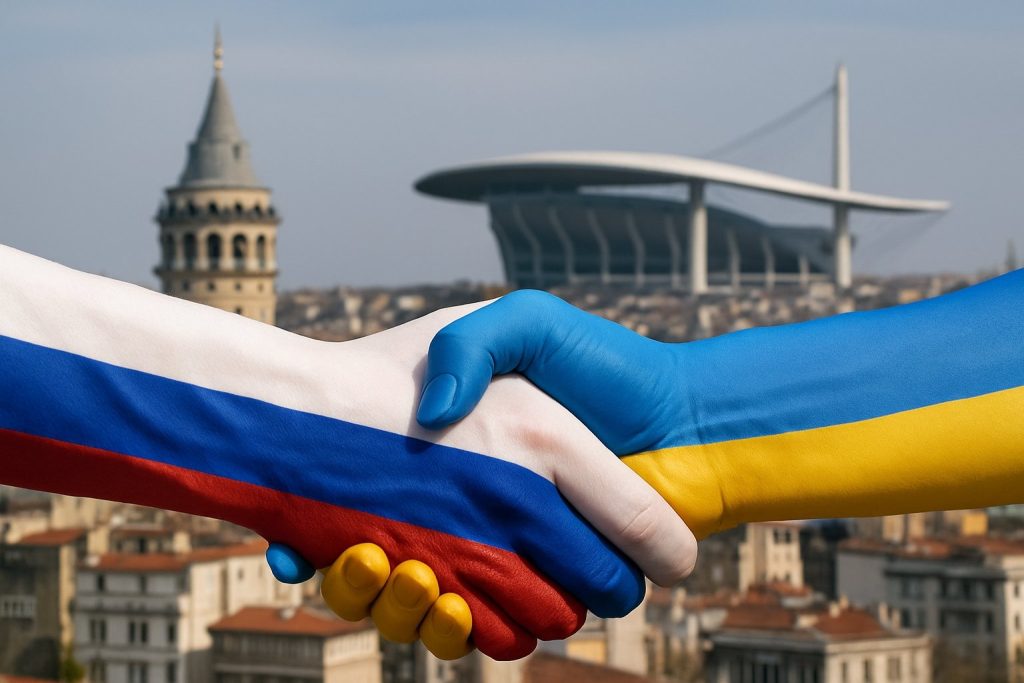As Istanbul gears up to host peace talks between Russia and Ukraine, on Thursday, the city isn’t just making headlines as a diplomatic mediator – it’s staking its claim as a future capital of global sport.
The summit, aiming to halt a war that has shaken the continent since February 2022, carries implications far beyond politics.
For Istanbul, it’s a chance to flex its muscles on the international stage – not just as a peacemaker, but as a world-class sporting hub.
Sporting sanctions
In the war’s immediate aftermath, Russia’s isolation from international sports was swift.
FIFA, UEFA, the IOC, and other federations moved fast, banning Russian teams and athletes across football, tennis, and the Olympics.
Belarusian athletes were caught in the crossfire too.
Ukrainian athletes faced their own battlefront: bombed-out training grounds, displaced teams, and broken infrastructure.
Many relocated across Europe, with Türkiye offering safe harbor for camps and friendlies. The entire European sporting calendar was reshaped.
Now, Istanbul’s peace summit may mark a turning point – not just for diplomacy, but for sport.
Soft power play: Istanbul’s global sporting ambitions
This isn’t Istanbul’s first rodeo.
The city hosted Russia-Ukraine talks back in March 2022, brokering a grain deal that eased global food anxieties.
Now, it’s stepping up again, offering a grander stage.
Hosting high-stakes diplomacy positions Istanbul as more than a crossroads of continents. It’s a stage-setter for major tournaments.
For instance, speaking at the opening of UEFA’s new Istanbul office last month, President Recep Tayyip Erdoğan exuded confidence in the country’s ability to host any major international event, including the Olympics.
Erdoğan highlighted Türkiye’s remarkable sports infrastructure and rapid growth over the past 23 years, driven by substantial investments.
“We have raised Türkiye’s capacity to a level where we can host every international sporting event, including the Olympics,” Erdoğan said. “Our national teams shine in UEFA’s tournaments every year, and we’ve captured the hearts of football fans.”
The city’s sporting resume speaks volumes: two UEFA Champions League finals (2005, 2023), the 2010 FIBA World Championship, top-tier motorsport events, and ongoing bids for the 2036 Olympics.
Thousands of journalists, diplomats, and officials descending on the city will stress-test its infrastructure, venues like Dolmabahçe Palace, modern conference centers, and world-class stadiums. But it’s also a golden audition.
Uneasy road to reintegration
If the summit succeeds, sports could become one of peace’s first dividends.
Russian teams like Zenit and Spartak Moscow, exiled from UEFA competitions, might return, restoring depth and market appeal to European tournaments.
Yet that comeback won’t be easy. “Ukrainian fans won’t just forgive and forget,” says Oleksandr Prykhodko, a Kyiv-based journalist. “Trust will have to be earned, maybe through youth tournaments or neutral-host friendlies.”
Olympic reintegration also looms.
A cease-fire might soften the IOC’s stance before the 2026 Milan-Cortina Games, where Russian athletes may push to compete under national colors instead of neutral banners.
But resistance remains fierce in places like Poland and the Baltics.
Ukrainian athletes, for their part, stand to gain stability.
Many have trained abroad since 2022.
A cease-fire could bring them home and potentially restore Ukraine’s sports infrastructure.
Peace dividend
Few cities live and breathe football like Istanbul.
Galatasaray, Fenerbahçe, and Beşiktaş boast some of Europe’s most electric atmospheres.
Now, with global eyes on Istanbul, Turkish football is poised to capitalize on the free advertising.
The Turkish Süper Lig could benefit financially.
Peace talk traffic means packed hotels, buzzing restaurants, and media dollars.
And as Türkiye aims to modernize its domestic game, with investments in stadiums, grassroots football, and the Turkish Football Federation’s long-term strategies, the summit fits neatly into its narrative of reform and readiness.
The cultural potential is just as big.
Galatasaray’s 2023 friendly with Shakhtar Donetsk raised funds for war victims and showed how football can foster solidarity.
A cease-fire could spark more initiatives: mixed-club charity games, Ukrainian-Russian team exchanges, or joint youth academies, all using Istanbul as neutral ground.


